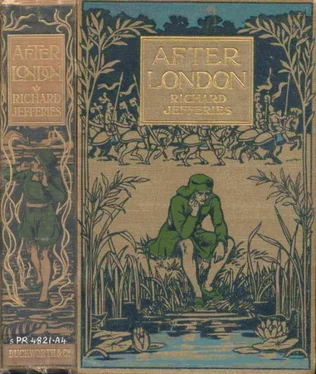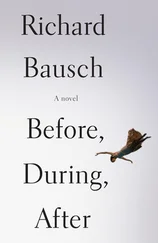Richard Jefferies - After London
Здесь есть возможность читать онлайн «Richard Jefferies - After London» весь текст электронной книги совершенно бесплатно (целиком полную версию без сокращений). В некоторых случаях можно слушать аудио, скачать через торрент в формате fb2 и присутствует краткое содержание. Город: London, Год выпуска: 1905, Издательство: Duckworth & Co., Жанр: sf_postapocalyptic, на английском языке. Описание произведения, (предисловие) а так же отзывы посетителей доступны на портале библиотеки ЛибКат.
- Название:After London
- Автор:
- Издательство:Duckworth & Co.
- Жанр:
- Год:1905
- Город:London
- ISBN:нет данных
- Рейтинг книги:4 / 5. Голосов: 1
-
Избранное:Добавить в избранное
- Отзывы:
-
Ваша оценка:
- 80
- 1
- 2
- 3
- 4
- 5
After London: краткое содержание, описание и аннотация
Предлагаем к чтению аннотацию, описание, краткое содержание или предисловие (зависит от того, что написал сам автор книги «After London»). Если вы не нашли необходимую информацию о книге — напишите в комментариях, мы постараемся отыскать её.
(1885), set in a future in which urban civilization has collapsed after an environmental crisis.” (From
).
This eBook is for the use of anyone anywhere at no cost and with almost no restrictions whatsoever. You may copy it, give it away or re-use it under the terms of the Project Gutenberg License included with this eBook or online at
* * *
After London — читать онлайн бесплатно полную книгу (весь текст) целиком
Ниже представлен текст книги, разбитый по страницам. Система сохранения места последней прочитанной страницы, позволяет с удобством читать онлайн бесплатно книгу «After London», без необходимости каждый раз заново искать на чём Вы остановились. Поставьте закладку, и сможете в любой момент перейти на страницу, на которой закончили чтение.
Интервал:
Закладка:
Tradition says that in the olden times there were horses of a slender build whose speed outstripped the wind, but of the breed of these famous racers not one is left. Whether they were too delicate to withstand exposure, or whether the wild dogs hunted them down is uncertain, but they are quite gone. Did but one exist, how eagerly it would be sought out, for in these days it would be worth its weight in gold, unless, indeed, as some affirm, such speed only endured for a mile or two.
It is not necessary, having written thus far of the animals, that anything be said of the birds of the woods, which every one knows were not always wild, and which can, indeed, be compared with such poultry as are kept in our enclosures. Such are the bush-hens, the wood-turkeys, the galenæ, the peacocks, the white duck and the white goose, all of which, though now wild as the hawk, are well known to have been once tame.
There were deer, red and fallow, in numerous parks and chases of very old time, and these, having got loose, and having such immense tracts to roam over unmolested, went on increasing till now they are beyond computation, and I have myself seen a thousand head together. Within these forty years, as I learn, the roe-deer, too, have come down from the extreme north, so that there are now three sorts in the woods. Before them the pine-marten came from the same direction, and, though they are not yet common, it is believed they are increasing. For the first few years after the change took place there seemed a danger lest the foreign wild beasts that had been confined as curiosities in menageries should multiply and remain in the woods. But this did not happen.
Some few lions, tigers, bears, and other animals did indeed escape, together with many less furious creatures, and it is related that they roamed about the fields for a long time. They were seldom met with, having such an extent of country to wander over, and after a while entirely disappeared. If any progeny were born, the winter frosts must have destroyed it, and the same fate awaited the monstrous serpents which had been collected for exhibition. Only one such animal now exists which is known to owe its origin to those which escaped from the dens of the ancients. It is the beaver, whose dams are now occasionally found upon the streams by those who traverse the woods. Some of the aquatic birds, too, which frequent the lakes, are thought to have been originally derived from those which were formerly kept as curiosities.
In the castle yard at Longtover may still be seen the bones of an elephant which was found dying in the woods near that spot.
CHAPTER III
MEN OF THE WOODS
So far as this, all that I have stated has been clear, and there can be no doubt that what has been thus handed down from mouth to mouth is for the most part correct. When I pass from trees and animals to men, however, the thing is different, for nothing is certain and everything confused. None of the accounts agree, nor can they be altogether reconciled with present facts or with reasonable supposition; yet it is not so long since but a few memories, added one to the other, can bridge the time, and, though not many, there are some written notes still to be found. I must attribute the discrepancy to the wars and hatreds which sprang up and divided the people, so that one would not listen to what the others wished to say, and the truth was lost.
Besides which, in the conflagration which consumed the towns, most of the records were destroyed, and are no longer to be referred to. And it may be that even when they were proceeding, the causes of the change were not understood. Therefore, what I am now about to describe is not to be regarded as the ultimate truth, but as the nearest to which I could attain after comparing the various traditions. Some say, then, that the first beginning of the change was because the sea silted up the entrances to the ancient ports, and stopped the vast commerce which was once carried on. It is certainly true that many of the ports are silted up, and are now useless as such, but whether the silting up preceded the disappearance of the population, or whether the disappearance of the population, and the consequent neglect caused the silting, I cannot venture to positively assert.
For there are signs that the level of the sea has sunk in some places, and signs that it has become higher in others, so that the judicious historian will simply state the facts, and refrain from colouring them with his own theory as Silvester has done. Others again maintain that the supply of food from over the ocean suddenly stopping caused great disorders, and that the people crowded on board all the ships to escape starvation, and sailed away, and were no more heard of.
It has, too, been said that the earth, from some attractive power exercised by the passage of an enormous dark body through space, became tilted or inclined to its orbit more than before, and that this, while it lasted, altered the flow of the magnetic currents, which, in an imperceptible manner, influence the minds of men. Hitherto the stream of human life had directed itself to the westward, but when this reversal of magnetism occurred, a general desire arose to return to the east. And those whose business is theology have pointed out that the wickedness of those times surpassed understanding, and that a change and sweeping away of the human evil that had accumulated was necessary, and was effected by supernatural means. The relation of this must be left to them, since it is not the province of the philosopher to meddle with such matters.
All that seems certain is, that when the event took place, the immense crowds collected in cities were most affected, and that the richer and upper classes made use of their money to escape. Those left behind were mainly the lower and most ignorant, so far as the arts were concerned; those that dwelt in distant and outlying places; and those who lived by agriculture. These last at that date had fallen to such distress that they could not hire vessels to transport themselves. The exact number of those left behind cannot, of course, be told, but it is on record that when the fields were first neglected (as I have already described), a man might ride a hundred miles and not meet another. They were not only few, but scattered, and had not drawn together and formed towns as at present.
Of what became of the vast multitudes that left the country, nothing has ever been heard, and no communication has been received from them. For this reason I cannot conceal my opinion that they must have sailed either to the westward or to the southward where the greatest extent of ocean is understood to exist, and not to the eastward as Silvester would have it in his work upon the “Unknown Orb”, the dark body travelling in space to which I have alluded. None of our vessels in the present day dare venture into those immense tracts of sea, nor, indeed, out of sight of land, unless they know they shall see it again so soon as they have reached and surmounted the ridge of the horizon. Had they only crossed to the mainland or continent again, we should most likely have heard of their passage across the countries there.
It is true that ships rarely come over, and only to two ports, and that the men on them say (so far as can be understood) that their country is equally deserted now, and has likewise lost its population. But still, as men talk unto men, and we pass intelligence across great breadths of land, it is almost certain that, had they travelled that way, some echo of their footsteps would yet sound back to us. Regarding this theory, therefore, as untenable, I put forward as a suggestion that the ancients really sailed to the west or to the south.
As, for the most part, those who were left behind were ignorant, rude, and unlettered, it consequently happened that many of the marvellous things which the ancients did, and the secrets of their science, are known to us by name only, and, indeed, hardly by name. It has happened to us in our turn as it happened to the ancients. For they were aware that in times before their own the art of making glass malleable had been discovered, so that it could be beaten into shape like copper. But the manner in which it was accomplished was entirely unknown to them; the fact was on record, but the cause lost. So now we know that those who to us are the ancients had a way of making diamonds and precious stones out of black and lustreless charcoal, a fact which approaches the incredible. Still, we do not doubt it, though we cannot imagine by what means it was carried out.
Читать дальшеИнтервал:
Закладка:
Похожие книги на «After London»
Представляем Вашему вниманию похожие книги на «After London» списком для выбора. Мы отобрали схожую по названию и смыслу литературу в надежде предоставить читателям больше вариантов отыскать новые, интересные, ещё непрочитанные произведения.
Обсуждение, отзывы о книге «After London» и просто собственные мнения читателей. Оставьте ваши комментарии, напишите, что Вы думаете о произведении, его смысле или главных героях. Укажите что конкретно понравилось, а что нет, и почему Вы так считаете.












